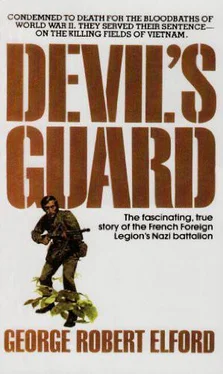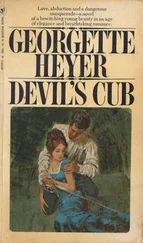“Make sure that nothing happens to these poor innocent civilians,” I told Krebitz who rode shotgun on the cart of the convoy leader. “We have about as many atrocities to our credit as we can take.”
The Viet Minh company was marching casually along the narrow causeway which ran between an expanse of rice paddies parallel to the forest line. The enemy was obviously ignorant of our presence in the shrubbery. The men of Gruppe Drei had spotted them in the drifting mist long before they entered the relatively coverless flatland; about a hundred guerrillas marching in two lines on either side of the road, “Idiots” Row” as our sharpshooters used to refer to such formations. Sergeant Krebitz, who with a platoon of machine gunners had gone forward to occupy a patch of thickets near the trail, now reported that the Viet Minh detachment was a band of green recruits rather than a fighting force. Only the foremost platoon of twenty terrorists were armed with automatic weapons. The rear guard of six veteran guerrillas carried vintage rifles. The rest of the “section” was unarmed. “I am delighted,” Sergeant Krebitz commented over the radio. “This is going to be duck shooting, Hans.”
“You should spare the recruits,” Xuey addressed me suddenly.
“And break our game rule about the golden reserves of Father Ho?”
“They would die innocently, for they are no more Communist than you are, Commander, and have probably joined the Viet Minh only upon the threat of instant death. They don’t have weapons because they are not trusted yet.”
“Maybe the company hasn’t got enough weapons.”
Xuey tapped my binoculars. “Have a look at the center of the column, Commander. There are eight men carrying crates, and those crates contain weapons.”
Xuey was probably right about the recruits. “Spare the lives of the unarmed ones,” he pleaded again. “Their families will need them.”
“They should have told that to the Viet Minh, Xuey.”
“No one can reason with the Viet Minh—you know that.”
“All right, I will try to spare the recruits.”
“Thank you, Commander.”
I called Krebitz again, asking him if he was well enough deployed to eliminate the armed platoon without causing casualties among the unarmed men. “My God,” he exclaimed, “are you having a sunstroke or something, Hans?”
“What do you mean, Rudolf?”
“I mean your good heart. Since when are you so concerned about the welfare of the Viet Minh?”
“Those recruits are not Viet Minh yet. Xuey asked me to give them a chance.”
“As you wish,” he grunted. “We will shoot the bad guys and let the not-so-bad guys live.”
“How about their rear guard?”
“The Abwehr will take care of them.”
“Proceed then,” I said, reminding him to aim low, as we would be moving ahead on the right flank and consequently some of our own troops might stroll into Gruppe Drei’s line of fire. “I will keep that in mind,” Krebitz reassured me.
“Don’t wait for my order to open fire. When you see them properly, let them have it.”
The sun was mounting higher and the mist over the paddies began to lift. Soon the enemy emerged into the open. Apart from an occasional cry of the paddy birds there was not a sound, so when the MG’s of Gruppe Drei opened up, their sharp staccato shattered the silence like a bolt out of the clear sky. Instantly the guerrilla detachment scattered and I had no way of knowing how many of the armed terrorists were killed. The Viet Minh rear guard—Schulze saw it—went spinning and tumbling down into the paddies, but a part of the platoon must have escaped, for a sporadic fire of enemy submachine guns could be heard from the road. However, the survivors were soon spotted and eliminated one after another, until the remnants of the platoon, half a dozen muddy and bewildered guerrillas, finally realized the hopelessness of their position and surrendered. The recruits followed suit. Covered with mire and most of them soaking wet, they scrambled to their feet holding their hands up, some of them still on the road, others in the knee-deep muck yelling for mercy. Most of them were almost children.
“Giap must be hard up for manpower,” Schulze commented, observing the miserable lot.
“That may be,” said Xuey, “but I think the Viet Minh has only discovered the advantage of recruiting small boys, Commander.”
“What advantage?”
“Young boys are rather easy to camouflage for one thing,” Xuey explained. “When the army comes into a village a thirteen-year-old boy may conceal his gun and become a harmless child.”
Now I understood Xuey’s reasoning and it made sense.
Gruppe Drei collected the enemy weapons. The guerrillas were separated from the recruits, many of whom were weeping openly. By then we had established a deadly reputation in the northern provinces and the commissars usually referred to us only as “the deathmakers” or “the beasts who spare none.”
I advised Xuey to speak to the recruits, which he gladly did.
“Return home,” I told them, “and say a prayer of gratitude to your god, whoever he may be. Thank your god that we captured you unarmed. Otherwise you would be dead men now.”
They left, still shaken but overjoyed at being alive. We watched them hurrying down the trail, calling to each other, whistling and chattering excitedly. When the last of them melted into the distant woods I turned my attention to the veteran guerrillas.
“Do you want to question them?” Krebitz asked.
I shrugged. “What for? They were only escorting the recruits to a predetermined point where another platoon would have taken charge of them.”
“We might intercept those too.”
“To hell with them.”
“And what about them?” He jerked a thumb toward the pathetic group of prisoners.
“To hell with them too!”
“Shoot them for a change,” Riedl suggested. “Your butchery with the bayonet makes me sick.”
“Why not?” Krebitz shrugged. “After all they are supplying their own bullets.”
The prisoners were executed and we moved on.A dreary routine.
By the summer of 1951 the Viet Minh had every reason to rejoice. Communism was progressing steadily in Indochina and the “freedom fighters” of Ho Chi Minh were in control of seventy percent of the rural areas. In the heavily garrisoned cities their influence was increasing; consequently the terrorist activities increased as well and soon became a serious problem.
The Communist strategy was a simple one. The Viet Minh mobilized the impoverished peasantry under the slogan “Kill the landowner and seize his land,” a rallying cry that appealed to the basest instinct of the scum. A call to murder, rape, and loot always rallies the scum of any country. For them, the Party offered a People’s Democracy—a Communist state which the have-nots were quite willing to accept. The majority of the Party members did not have the faintest idea what Communism meant but they understood the catch phrase “You have nothing to lose but your chains.”
The intelligentsia were being hoodwinked more tactfully through their patriotic sentiments and there was little talk about Marx, Lenin, or Communism. For the educated classes the bait was “independence.”
Regardless of their political beliefs, the majority of the population did agree on one issue: Indochina should rid herself of colonial overlords. In the rural areas the Viet Minh could enforce its “reforms” at will. Government officials, policemen, teachers, wealthy peasants, and merchants (anyone possessing more than about four heads of cattle or owned a well-stocked shop was considered rich) had been liquidated. Their property had been seized and distributed among the people, at least for the time being. Those who had hesitated or refused to accept property acquired through murder and robbery were terrorized into submission. The moment a peasant accepted and began to cultivate illegally acquired property he was in the hands of the Viet Minh and could but dread the return of the legal authority.
Читать дальше












